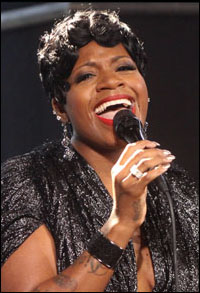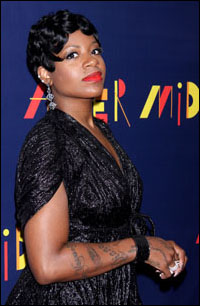
*
At the press preview for the new Broadway musical revue After Midnight, which began performances Oct. 18 at the Brooks Atkinson Theatre, Fantasia Barrino admitted that she was a bit nervous before offering members of the press a sneak peek of "Stormy Weather," the 1933 tune by Harold Arlen and Ted Koehler that she performs in the show. Maybe it was because she holds the music of the Jazz Age so close to heart. Maybe it was because two of her musical inspirations, Lena Horne and Billie Holiday, left their individual marks on the tune. Maybe it was because Barrino hadn't planned to return to Broadway after she left The Color Purple in 2008.
However, when producer Scott Sanders explained that After Midnight would explore the music of the 1920s and 30s and celebrate Duke Ellington's years at the Cotton Club, Barrino couldn't turn down the offer. The actress is the first in a series of headliners slated to grace the Brooks Atkinson stage throughout the show's run. Following Barrino, After Midnight will welcome Grammy Award winner k.d. lang and Grammy Award-winning artists Toni Braxton and Kenny "Babyface" Edmonds. Playbill.com caught up with the show's first star at the After Midnight meet-and-greet. She chatted about being given the chance to explore her favorite generation — Jazz.
You're coming back to Broadway. It's not about the role this time, but more about the music. What excites you about being able to free yourself and explore this music?
Fantasia Barrino: It's totally different from The Color Purple — musically — and my role [in After Midnight] is not as grueling as playing Celie. I always said I didn't think I would ever do Broadway again. They would ask me, and I would say, "I don't think so." About a week before [producer] Scott Sanders called me, I was listening to nothing but jazz, Billie Holiday, Ella Fitzgerald, Cab Calloway. I said, "I'm fasting from the radio. I don't want to hear no new school. I just want to go back and hear classic, old-school jazz music." My manger called and said, "Scott Sanders called. They said they have another play, and they want you to listen to what they're saying and see if you want to do it." So I came to New York and [we] went out to eat, and I said, "Tell me more, Scott." And, he said, "We're tapping into the 40s, 50s, 60s, Billie Holiday…" I said, "Stop right there!" He said, "What?" I said, "That's strange because that's all that I've been listening to." For me, it's like I [didn't] have to pray about it or think about it… It's like I was preparing myself before he asked me… To be a part of something so great.
These women — Billie Holiday and Ella Fitzgerald — did they serve as your vocal inspirations growing up?
| |
 |
|
| Fantasia Barrino | ||
| photo by Joseph Marzullo/WENN |
What excites you to about being able to bring this era — the 20s and 30s — to 2013 Broadway? After Midnight is riffing from the Cotton Club tradition of bringing in special guests — drawing in different audiences to relive this era.
FB: It excites me because it lets the younger generation know where it all started. Sometimes jazz can be looked over, and people can say, "I don't get it." And, I say, "Well, you have to sit down and open your ears and listen to everybody that is a part of the song — the saxophone, the piano… Everybody has a voice as well as the artist." So before I came to New York, all I was doing was playing the music. My 12-year-old daughter would come in the room and say, "Who is that?" And then Ella Fitzgerald would begin to scat, and she'd say, "Well, what do you call that?" It made me excited — she wants to know: "What type of music is this, Mommy? Where did it all start?" Everyone who is going to come, who hasn't listened to jazz or known the history of it, will get to see where it all started and who paved the way for us.
I find it interesting that Langston Hughes' poetry and language is used to guide the audience through the piece. Did artists of this era have an affect on who you grew up to be? What special ties do you haveb to the Jazz Age?
FB: I would always say Billie Holiday is my favorite, and Ella Fitzgerald, Josephine Baker, Cab Calloway — they're all my favorites. I'm only 29 years old, but I grew up on their music, and I have a musical family. My grandfather loved B.B. King — that's all he would play. I think, at such a young age, everybody would say, "You have such an old soul," and I didn't get it. But I think that these women [influenced me] — after I started going though a lot of different situations in my life and beginning to really listen to them… I'd watch them on YouTube and how they carried themselves and how they spoke, and whenever they'd sing it'd be completely different from their speaking voice. You would [think], "Whoa! Where did that come from?" I think that they were soul singers. They sung their feelings. They sung their life — what they were going through — and I'm just like that.
Can you tell me about the world that director-choreographer Warren Carlyle is creating? We're getting taken back to this sexy and sultry era.
| |
 |
|
| Fantasia Barrino | ||
| Photo by Joseph Marzullo/WENN |
You just told me that before your performance of "Stormy Weather," you were a bit nervous. There's a sense of ownership to these songs. Icons have sang them. Is there pressure to breathe new life into this music?
FB: A lot of pressure, I would say, because you want to make the Ella Fitzgeralds and the Billie Holidays proud. These songs meant a lot to them… Even Lena Horne. You don't want to come behind it and half do it or not bring it to life. I want to make [Warren] happy and, for those women whom I've been studying, I want to be able to step into their shoes so the audience can feel who they were and what they brought to the music.
(Playbill.com staff writer Michael Gioia's work appears in the news, feature and video sections of Playbill.com as well as in the pages of Playbill magazine. Follow him on Twitter at @PlaybillMichael.)










